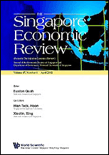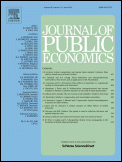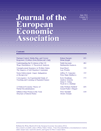
Economics Ecology Socium
Scope & Guideline
Innovating interdisciplinary research for a balanced future.
Introduction
Aims and Scopes
- Sustainable Economic Development:
The journal emphasizes research on sustainable economic practices, exploring how economic activities can be aligned with ecological preservation and social equity. - Innovation and Technology Integration:
A core focus on the role of innovation in economic growth, particularly through the lens of technology integration in various sectors, including digitalization and blockchain. - Social Economy and Community Development:
The journal examines the social economy's contributions to community resilience, focusing on inclusive practices that promote social welfare alongside economic growth. - Circular Economy Practices:
Research on circular economy models is a significant theme, exploring how businesses can minimize waste and maximize resource efficiency through innovative practices. - Human Capital and Labor Dynamics:
The journal investigates the dynamics of human capital development, labor market trends, and the impact of education and training on workforce capabilities. - Public Policy and Economic Regulation:
The journal addresses the role of public policy in shaping economic landscapes, particularly in sectors like agriculture, maritime transport, and energy.
Trending and Emerging
- Digitalization and Economic Security:
The integration of digital technologies in economic practices and its implications for investment security have gained prominence, reflecting the global trend towards digital transformation. - Circular Economy and Sustainability Indicators:
An increasing number of studies are exploring the metrics and indicators for assessing circular economy practices, emphasizing the need for quantifiable measures of sustainability. - Green Entrepreneurship and Social Impact:
Research on innovative models of green entrepreneurship is on the rise, highlighting the social impacts of sustainable business practices on local economies. - Public-Private Partnerships in Crisis Management:
There is a growing interest in analyzing public-private partnerships, particularly in the context of managing crises such as wartime economies and pandemics. - Human Resources Management in a Digital Age:
Emerging themes include the role of human resources management in adapting to digital transformations and enhancing employee engagement in increasingly remote and flexible work environments.
Declining or Waning
- Traditional Industrial Growth Models:
There has been a noticeable decrease in research focusing on conventional industrial growth models, likely due to the increasing emphasis on sustainability and innovation-driven growth. - Agricultural Cooperatives:
While historically significant, studies dedicated to the operational dynamics of agricultural cooperatives have diminished, possibly overshadowed by broader discussions on sustainable agribusiness practices. - Economic Indicators in Isolation:
The trend of analyzing economic indicators in isolation without considering social or environmental impacts appears to be waning, as integrative approaches gain traction. - Macro-Economic Policies without Ecological Considerations:
Research concentrating solely on macro-economic policies without addressing ecological implications has decreased, as the journal increasingly prioritizes interdisciplinary approaches. - Analysis of Labor Market Trends Pre-COVID-19:
The focus on labor market analyses prior to the COVID-19 pandemic has diminished, as new studies pivot to the impact of the pandemic on labor dynamics and employment strategies.
Similar Journals

SINGAPORE ECONOMIC REVIEW
Advancing economic insights for a global audience.SINGAPORE ECONOMIC REVIEW, published by WORLD SCIENTIFIC PUBL CO PTE LTD, stands as a prominent platform for research in the fields of economics and econometrics since its inception in 1983. With an ISSN of 0217-5908 and an E-ISSN of 1793-6837, this journal caters to a diverse audience by presenting high-quality, rigorously reviewed articles that address pressing economic issues both in Singapore and globally. Currently classified in the Q3 category for Economics and Econometrics for 2023, it ranks #265 out of 716 in Scopus, placing it in the 63rd percentile among economic journals. Although not open access, the articles published here contribute valuable insights into the evolving dynamics of economic theory and practice, making it an essential resource for researchers, educators, and policymakers alike. The journal's commitment to advancing economic research continues to foster dialogue and inspire innovative approaches within the academic community.

Zhurnal Novaya Ekonomicheskaya Assotsiatsiya-Journal of the New Economic Association
Connecting Scholars through Open Access EconomicsZhurnal Novaya Ekonomicheskaya Assotsiatsiya-Journal of the New Economic Association, published by CONSAS CONFERENCE, is a pivotal platform for advancing research in the fields of economics and finance. With an ISSN of 2221-2264, this journal facilitates the dissemination of innovative and insightful research findings that contribute to the understanding of contemporary economic issues. Operating as an open-access journal, it ensures broad accessibility for researchers, professionals, and students engaged in economic studies. The journal’s recent recognition within the Q4 category in Economics and Econometrics, alongside a Q3 classification in Finance for 2023, highlights its growing significance within the academic community. Despite its relatively nascent journey from 2016 to 2024, the journal, based in the Russian Federation with an address at VAN DER STERR BLDG, RHODES DR, MOWBRAY 7785, SOUTH AFRICA, contributes crucial scholarly dialogue by welcoming diverse perspectives and methodologies. By prioritizing rigorous research and comprehensive review processes, it aims to elevate the standards of economic discourse and facilitate impactful exchanges among scholars worldwide.

JAHRBUCHER FUR NATIONALOKONOMIE UND STATISTIK
Fostering Academic Excellence in Economic DiscourseJAHRBUCHER FUR NATIONALOKONOMIE UND STATISTIK, published by WALTER DE GRUYTER GMBH, is a prominent academic journal based in Germany, specializing in the fields of economics, econometrics, and social sciences. Established in 1863, this journal has a rich history of contributing to scholarly discourse and has evolved through various converged years, ensuring its relevance in contemporary research. With an impressive impact reflected in its Scopus rankings, including a Q1 status in Social Sciences and Q2 in both Business and Economics categories as of 2023, this journal serves as an essential resource for researchers, professionals, and students seeking to explore intricate economic theories and statistical methodologies. Although it is not an Open Access publication, its comprehensive articles and rigorous peer-review process provide invaluable insights into the complexities of national and global economics. The journal's commitment to academic excellence and its influential platform make it a vital source for anyone dedicated to advancing their knowledge and understanding of economic and statistical analysis.

Montenegrin Journal of Economics
Bridging Theory and Practice in EconomicsMontenegrin Journal of Economics, published by ECONOMIC LABORATORY TRANSITION RESEARCH PODGORICA-ELIT, stands as a prominent platform for scholarly discourse in the field of Economics, Econometrics, and Finance. With an ISSN of 1800-5845 and an E-ISSN of 1800-6698, this open access journal has been providing accessible research output since 2005, contributing significantly to the global academic community. The journal’s impact is reflected in its Q2 ranking in the 2023 category of Economics, Econometrics and Finance, holding a commendable position within the 81st percentile according to Scopus rankings. The scope includes a wide array of topics pertinent to economics and finance, encouraging contributions that enhance understanding of both local and global markets. With a focus on quality research, the journal aims to disseminate knowledge that supports informed policy-making and fosters economic development, making it an invaluable resource for researchers, professionals, and students dedicated to the evolving landscape of economic studies.

Economics & Sociology
Empowering Researchers with Open Access to Critical Insights.Economics & Sociology is a prominent open-access journal published by the CENTER SOCIOLOGICAL RESEARCH, based in Poland. With an ISSN of 2071-789X and an E-ISSN of 2306-3459, this journal has been serving the academic community since 2014 by facilitating the dissemination of impactful research in the fields of economics, sociology, and their intersections. With its rigorous peer-review process, Economics & Sociology has achieved an impressive standing in various quartiles, ranked as Q2 in disciplines such as Business, Management and Accounting, Economics, Econometrics and Finance, and Social Sciences as of 2023. Its Scopus rankings demonstrate its significance, placing it within the top percentile rankings across multiple categories. The journal aims to foster innovative and empirical research that not only contributes to theoretical frameworks but also provides practical insights into societal dynamics. By embracing an open-access model, it ensures that valuable knowledge is accessible to a wider audience, making it a vital resource for researchers, professionals, and students interested in the evolving landscapes of economics and sociology.

CHINA ECONOMIC REVIEW
Transforming Understanding of China’s Economic LandscapeChina Economic Review, published by Elsevier Science Inc, stands as a leading academic journal dedicated to the rigorous exploration of economic and financial issues pertinent to China and its place in the global economy. Established in 1989, this journal has built a robust reputation over the years, achieving a prestigious Q1 ranking in both Economics and Econometrics and Finance as of 2023. With a Scopus rank placing it in the top 93rd percentile for both categories, the journal serves as a vital resource for researchers, policymakers, and students alike, facilitating a deeper understanding of China’s economic dynamics. Although not an Open Access publication, articles are rigorously peer-reviewed, ensuring high-quality contributions that advance the field. With the scope covering a diverse range of topics, from market trends to fiscal policies, China Economic Review remains essential for those looking to engage with cutting-edge research and insights into one of the world's largest economies.

REVUE ECONOMIQUE
Pioneering Perspectives in the World of EconomicsREVUE ECONOMIQUE, published by PRESSES FOND NAT SCI POLIT in France, is a distinguished academic journal with an ISSN of 0035-2764 and an E-ISSN of 1950-6694. Established in 1974, the journal has evolved significantly over the years, focusing on a diverse range of topics within the field of economics, econometrics, and finance. With its commitment to presenting in-depth research and innovative perspectives, REVUE ECONOMIQUE serves as a vital resource for scholars, professionals, and students seeking to enhance their understanding of economic theories and practices. Although it is currently categorized in the Q4 quartile, ranking 241 out of 288 in the field, the journal aims to foster new dialogues and disseminate valuable insights that contribute to the economic discourse. The journal is not available as open access, but its rich repository of articles continues to attract readers interested in the complexities of economic dynamics. For more information, you can refer to their address at 27 RUE SAINT-GUILLAUME, 75341 PARIS 07, FRANCE.

Journal of the Knowledge Economy
Bridging Disciplines to Elevate the Knowledge EconomyThe Journal of the Knowledge Economy is a premier interdisciplinary journal published by SPRINGER, focusing on the dynamic intersection of knowledge creation and economic development. With an ISSN of 1868-7865 and E-ISSN 1868-7873, this journal has been at the forefront of academic discourse since its inception in 2010 and continues to thrive through 2024. Featuring a Q2 ranking in the prestigious field of Economics and Econometrics, it stands out with a Scopus rank of #132 out of 716, placing it in the top 81st percentile among its peers. The journal emphasizes scholarly articles that explore the impact of knowledge on economic practices, including how innovation drives business and policy decisions in a global context. Although not an open-access publication, it provides substantial insights for researchers, professionals, and students alike, ensuring that critical knowledge reaches a wide audience. Located in Germany, the journal invites contributions from a diverse range of disciplines, underscoring its importance in shaping the discourse around the knowledge economy and its vital role in contemporary economic landscapes.

JOURNAL OF PUBLIC ECONOMICS
Transforming public economics with influential research.JOURNAL OF PUBLIC ECONOMICS is a leading academic journal published by ELSEVIER SCIENCE SA, dedicated to the field of public economics, which encompasses a broad range of topics including taxation, government expenditure, and the effects of public policies on the economy. With an impressive impact factor reflected by its prestigious Q1 category rankings in both Economics and Finance, this journal is recognized as a vital resource for researchers and practitioners alike. Its robust Scopus rankings place it in the top percentile, with Finance ranked #8 out of 317 and Economics ranked #19 out of 716, demonstrating its influential role in advancing knowledge and fostering discourse within its discipline. Covering the period from 1972 through 2024, the journal publishes original research and insightful reviews that encourage evidence-based policy-making, making it an essential read for those seeking to deepen their understanding of the intersections between economics and public policy. Please note that the journal operates under a subscription model of access, ensuring high-quality content is readily available to its readership.

Journal of the European Economic Association
Unveiling the Dynamics of Economics for a Better TomorrowThe Journal of the European Economic Association, published by Oxford University Press, stands as a cornerstone in the field of economics, boasting a strong impact factor that reflects its high citation rates and significance among peers. With an impressive Scopus ranking of 12 out of 288 in general economics, encompassing a remarkable 96th percentile, this journal is recognized for its rigorous peer-reviewed research contributions that advance the understanding of economic theory and policy. Dedicated to publishing innovative studies and theoretical advancements since its inception in 2003, it continues to engage scholars worldwide, providing vital insights applicable to both academia and industry. Although it does not follow an open-access model, the journal's extensive reach and commitment to excellence make it an essential resource for researchers, professionals, and students seeking to deepen their understanding of contemporary economic issues. Based in the United States, the journal reflects a European perspective on global economic challenges, making it indispensable for those at the forefront of economic research.